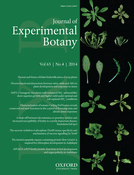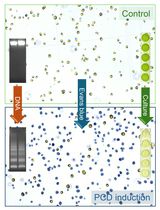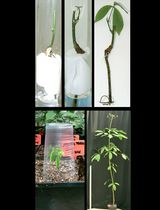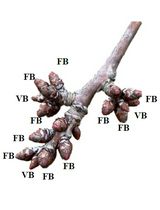- EN - English
- CN - 中文
Salinity Assay in Arabidopsis
拟南芥耐盐实验
发布: 2014年08月20日第4卷第16期 DOI: 10.21769/BioProtoc.1216 浏览次数: 20710
评审: Arsalan DaudiAnonymous reviewer(s)
Abstract
Salinity is an important environmental constraint to crop productivity in arid and semi-arid regions of the world. The evaluation of the responses to salinity of different Arabidopsis ecotypes or transgenic lines is important to identify and investigate the role of different key genes. These new characterized genes involved in the response to salinity stress are of great interest to be incorporated in crops breeding programs. Here we provide a reproducible method to evaluate the performance of Arabidopsis lines to salinity stress by analysing primary and lateral root growth and fresh weight of plants grown under in vitro conditions in growth chambers. Even though NaCl is the most frequent used salinity tests, other salts (e.g. KCl, MgCl2) can be also evaluated by this method. Arabidopsis plants can be maintained for 15-20 days in these conditions, although effects on growth and biomass can be observed, depending on the used salt and concentration, within the first 10 days.
Keywords: Salinity tolerance (耐盐性)Materials and Reagents
- Arabidopsis thaliana ecotype Columbia (Col-0) and transgenic Arabidopsis lines 35S::SlCDF1 and 35S::SlCDF3 (background Col-0) seeds
- 70% ethanol
- Sodium hypochlorite (NaClO)
- Sodium dodecylsulphate (SDS)
- Sterile water
- Murashige & Skoog (MS) mediun including B5 vitamins (Duchefa Biochemie BV, catalog number: M0231 )
- MES (Duchefa Biochemie BV, catalog number: M1503 )
- Sucrose
- NaCl
- Agar (Duchefa Biochemie BV, catalog number: P1001 )
- Medium composition (see Recipes)
Equipment
- Square (120 x 120 mm) petri dishes polystyrene sterile
- Growth chamber
- Autoclave
- Shaker
- Image capturing device
- Precision balance (± 0.0001)
Software
- Image J software (http://rsb.info.nih.gov/ij) (Abrámoff et al., 2004)
Procedure
文章信息
版权信息
© 2014 The Authors; exclusive licensee Bio-protocol LLC.
如何引用
Corrales, A. R., Carrillo, L., Nebauer, S. G., Renau-Morata, B., Sánchez-Perales, M., Fernández-Nohales, P., Marqués, J., Granell, A., Pollmann, S., Vicente-Carbajosa, J., Molina, R. V. and Medina, J. (2014). Salinity Assay in Arabidopsis. Bio-protocol 4(16): e1216. DOI: 10.21769/BioProtoc.1216.
分类
植物科学 > 植物生理学 > 非生物胁迫
植物科学 > 植物生理学 > 植物生长
植物科学 > 植物发育生物学 > 综合
您对这篇实验方法有问题吗?
在此处发布您的问题,我们将邀请本文作者来回答。同时,我们会将您的问题发布到Bio-protocol Exchange,以便寻求社区成员的帮助。
Share
Bluesky
X
Copy link














